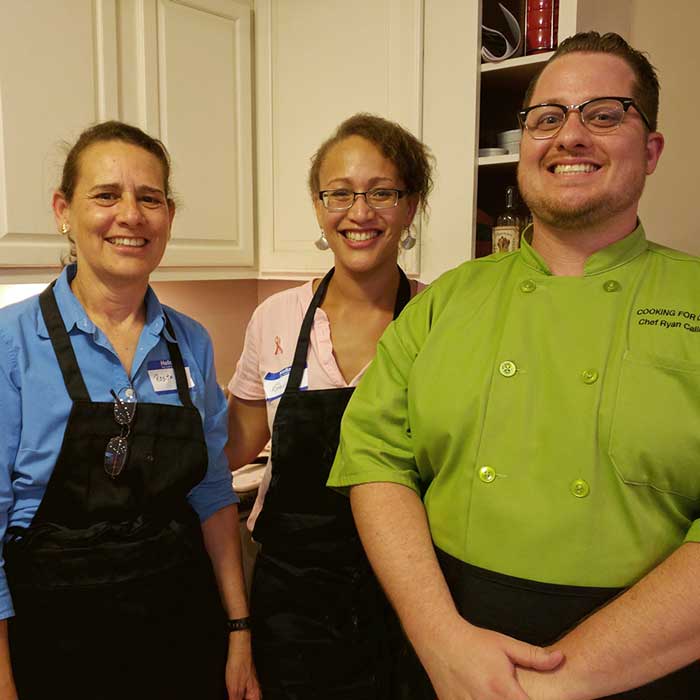Mouth Sores From Chemo

Mouth sores from chemo are an often reported and highly painful side effect of cancer and chemotherapy treatment. They can be unavoidable as the chemotherapy treatments begin to break down the softer tissues in your body. However, there are some common sense cooking techniques and tips to take into consideration so that we don’t exacerbate mouth sores when eating.
1. Be conscious of heat: thermal and spicy.
Thermal Heat
While it may be soothing to your throat to drink a nice hot cup of tea or broth, hot liquids can make mouth sores worse by burning the already irritated skin. This will set the healing process back and make it more difficult for your mouth sores to heal quickly.
Spicy Heat
I normally strongly espouse the use of spicy flavors in cooking. But when you have mouth sores, you want to be very careful with the amount of spiciness that you ingest during treatment. A touch of spice will naturally warm up a dish. However, if you add too much spicy, the burning sensation that spicy seasonings naturally impart in your food will physically burn the open sores in your mouth. This is not something you want, especially when dealing with all the other numerous treatment side effects that occur. A quick tip to balance spicy flavors while you cook is to utilize vinegar to help cool down the spiciness of a recipe.
Mouth Sores in Kids
This is especially important to remember in kids who are fighting cancer. They usually do not have the same level of pain tolerance that an adult has. Any pain added can be excruciating. A perfect example of this are the ear infections that I used to get as a child. At the time, they seemed like the most painful thing that could ever possibly happen to me. But now, being an adult and having much better control of both my body and perception of pain, I am able to tolerate much more painful things on a daily basis.
Remember to keep in mind that everything that happens to a child, happens in a greater magnitude than to an adult. If mouth sores are aggressive, consider low temperature foods. What I mean by this is foods that can either be eaten at room temperature, refrigerator temperature, or freezer temperature. Because hot foods can agitate mouth sores, this can lead to an extremely painful experience.
2. Be texture conscious with your food.
Dry foods like crackers, cookies, chips, and pretzels may taste delicious. But when you have mouth sores, they can be your worst enemy. The abrasive textures and rough edges of these foods can actually rub your mouth sores raw and make them worse. This can sometimes even lead to inadvertent bleeding!
You want to always ensure that all the foods you are eating are soft in texture while you have mouth sores. And while a nice toasted sub sandwich will sound amazing, the fallout from eating such a rough substance is sure to leave you in a raw situation.
With mouth sores, you really need to stick to soft non-abrasive textures. These don’t have to be just soups and stews though. You can absolutely eat foods that are softer in texture like cold sandwiches, meals cooked in a slow cooker, pasta, mashed potatoes, smoothies, and the like.
3. Don’t let your mouth become too dry.
Hydration
Use care when ingesting caffeine, salt, acidic foods and liquids. While a nice cup of tea or your favorite cola drink may sound refreshing, the high acidity and caffeine can actually leave you more dehydrated than when you started. Salt, while it has many re-hydrating properties, can actually dry out your mouth if it is taken in excessive quantities.
Make certain to drink lots of fluids during cancer treatment. Don’t make it difficult for your mouth to get hydration. The most logical way to stay hydrated is, of course, by ingestion. If possible, frequently sip water and rinse it around your mouth before swallowing.
During my mother’s cancer treatments, I would physically hold a cup of water with a straw for her to sip every hour to ensure she stayed properly hydrated.
Mouth Rinses
You can also try an over the counter dry mouth rinse. Many oncologists will recommend a dry mouth rise for those with chronic dry mouth. These can help, but are not an end-all-beat-all solution to ending dry mouth. Many oncologists and cancer fighters report success with dry mouth rinses.
Other cancer fighters have reported success with a salt water rinse. Simply add a tablespoon of salt to 8 ounces of water and stir well. Rinse in your mouth like a mouth wash. Spit out the mixture when done. Do not swallow the salt water. It will make you nauseous.
4. Be conscious of overly acidic ingredients.
Lemon juice and vinegar are powerful palate cleansers, but their high acidity can actually cause a burning sensation in your mouth sores. If you are using either citrus juices or vinegars to combat metallic tastes make certain that you are cooking them into the dish or diluting them in some way before you ingest them.
This is really all there is to mouth sores as far as cooking is concerned. Remember to keep a journal and write down what works for you and what does not work for you.